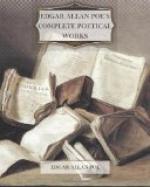Duke. Retire!—so soon?
Cas. What ho! Benito!
Rupert!
His
lordship’s chambers—show his lordship
to them!
His
lordship is unwell.
(Enter Benito.)
Ben. This way, my lord!
(Exit, followed by Politian.)
Duke. Retire! Unwell!
Bal. So please you, sir.
I fear me
’Tis
as you say—his lordship is unwell.
The
damp air of the evening—the fatigue
Of
a long journey—the—indeed I had
better
Follow
his lordship. He must be unwell.
I
will return anon.
Duke. Return anon!
Now
this is very strange! Castiglione!
This
way, my son, I wish to speak with thee.
You
surely were mistaken in what you said
Of
the Earl, mirthful, indeed!—which of us
said
Politian
was a melancholy man?
(Exeunt.)
* * * * *
POEMS OF YOUTH
* * * * *
INTRODUCTION TO POEMS.—1831.
LETTER TO MR. B—.
“WEST POINT, 1831
“DEAR B—
...
Believing only a portion of my former volume to be worthy a second edition—that small portion I thought it as well to include in the present book as to republish by itself. I have therefore herein combined ‘Al Aaraaf’ and ‘Tamerlane’ with other poems hitherto unprinted. Nor have I hesitated to insert from the ‘Minor Poems,’ now omitted, whole lines, and even passages, to the end that being placed in a fairer light, and the trash shaken from them in which they were imbedded, they may have some chance of being seen by posterity.
“It has been said that a good critique on a poem may be written by one who is no poet himself. This, according to your idea and mine of poetry, I feel to be false—the less poetical the critic, the less just the critique, and the converse. On this account, and because there are but few B——s in the world, I would be as much ashamed of the world’s good opinion as proud of your own. Another than yourself might here observe, ’Shakespeare is in possession of the world’s good opinion, and yet Shakespeare is the greatest of poets. It appears then that the world judge correctly, why should you be ashamed of their favorable judgment?’ The difficulty lies in the interpretation of the word ‘judgment’ or ‘opinion.’ The opinion is the world’s, truly, but it may be called theirs as a man would call a book his, having bought it; he did not write the book, but it is his; they did not




